California's AB 2273, effective since January 1, 2024, prohibits employers from discriminating against employees for off-duty cannabis use, marking a significant shift in California cannabis employment laws. However, safety-sensitive positions and federal contractors maintain exemptions from these new protections.
Key Takeaways
- AB 2273 protects California employees from discrimination based on off-duty marijuana use, including hiring, firing, and workplace penalties.
- Safety-sensitive jobs remain exempt from cannabis protections, including positions requiring federal clearance, operating heavy machinery, or supervising minors.
- Drug testing limitations now apply to most California employers, who cannot use positive cannabis tests as sole grounds for adverse employment actions.
- Federal contractors and positions requiring Department of Transportation clearance maintain existing drug testing and termination policies.
- Building trades and construction workers receive specific protections under the new legislation, despite the physical nature of their work.
- Both employees and employers must understand the nuanced exceptions and compliance requirements to navigate the changing legal landscape effectively.
Understanding California's AB 2273 Cannabis Employment Protections
California Assembly Bill 2273 represents the most significant change to California cannabis employment laws in decades. This legislation prohibits employers from discriminating against job applicants or employees based on their off-duty cannabis use. The groundbreaking law addresses the growing disconnect between California's legal cannabis market and outdated employment practices.
The new protections extend beyond simple hiring decisions. Moreover, employers cannot terminate, discipline, or otherwise penalize workers solely because they test positive for cannabis metabolites. The law recognizes that cannabis metabolites can remain detectable long after impairment has subsided, sometimes weeks after consumption.
| Protected Activities | Employer Restrictions |
| Off-duty cannabis consumption | Cannot fire based on positive test |
| Legal medical marijuana use | Cannot refuse to hire |
| Cannabis metabolite presence | Cannot discipline or demote |
AB 2273 builds upon California's existing medical marijuana protections while extending coverage to recreational users. The legislation acknowledges that off-duty cannabis use, like alcohol consumption, should not automatically disqualify someone from employment. This represents a fundamental shift in how California approaches workplace drug policies and employee privacy rights.
Who Is Protected Under California Cannabis Employment Laws
Most California workers now enjoy protection from cannabis-based employment discrimination. The law covers full-time employees, part-time workers, and job applicants across virtually all industries. Both medical marijuana patients and recreational cannabis users receive equal protection under AB 2273.
Building trades workers, including construction employees, electricians, and plumbers, receive specific mention in the legislation. Despite working in potentially hazardous environments, these workers cannot face discrimination solely for off-duty cannabis use. The law recognizes that proper safety protocols and workplace impairment policies can address safety concerns without blanket cannabis prohibitions.
Additionally, the protections apply regardless of whether cannabis use is medical or recreational. California employers cannot distinguish between these categories when making employment decisions. This unified approach simplifies compliance and ensures equal treatment for all cannabis users operating within state law.
Covered Employees and Positions
The new California off-duty cannabis use employment protections extend to nearly all worker categories. Service industry employees in restaurants, retail, and hospitality receive full protection under the law. Office workers and professionals in non-safety-sensitive roles also benefit from these comprehensive protections.
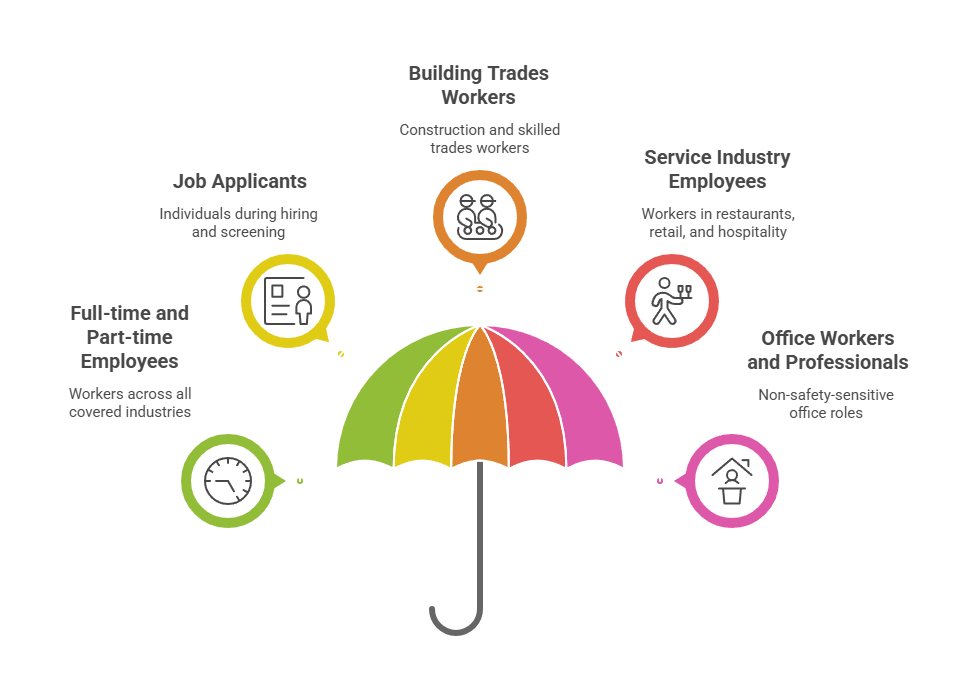
- Full-time and part-time employees across all covered industries
- Job applicants during the hiring process and pre-employment screening
- Building trades workers including construction and skilled trades
- Service industry employees in restaurants, retail, and hospitality
- Office workers and professionals in non-safety-sensitive roles
The protections create a level playing field for workers across different industries. Consequently, employers must revise their hiring and employment practices to comply with the new requirements.
Medical Marijuana Patients
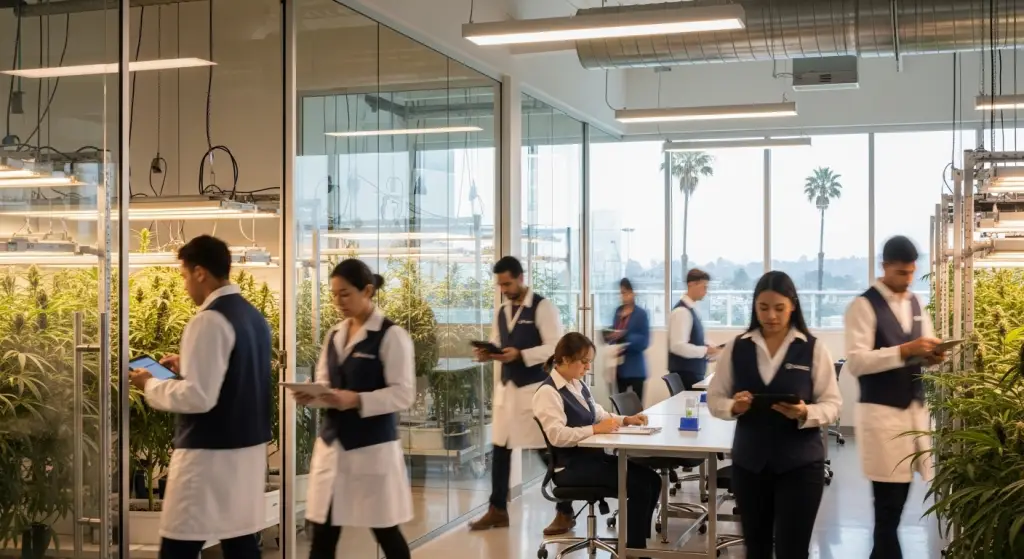
Medical marijuana patients receive enhanced protections under California cannabis employment laws. These workers often rely on cannabis to manage serious medical conditions, making employment discrimination particularly harmful. The law recognizes that medical necessity should not result in job loss or career limitations.
Employers must engage in an interactive process with medical marijuana patients, similar to other disability accommodations. While employers cannot require on-site cannabis use accommodation, they must consider reasonable alternatives. This might include modified schedules, alternative treatments, or adjusted responsibilities that don't compromise safety.
Safety-Sensitive Position Exemptions
California's cannabis employment protections include significant exemptions for safety-sensitive positions. These roles involve responsibilities where impairment could pose serious risks to public safety, national security, or vulnerable populations. Understanding these exemptions is crucial for both employers and workers in affected industries.
Safety-sensitive position exemptions recognize legitimate safety concerns while preventing employers from using safety as a pretext for general cannabis discrimination. The law requires employers to demonstrate that positions genuinely involve safety-sensitive responsibilities. Generic safety concerns or customer-facing roles typically don't qualify for exemptions.
| Exempt Position Type | Justification | Testing Allowed |
| Federal security clearance | National security requirements | Yes |
| DOT-regulated roles | Transportation safety | Yes |
| Healthcare direct care | Patient safety | Yes |
Employers claiming safety-sensitive exemptions must maintain detailed documentation justifying these classifications. California cannabis employment laws require specific, demonstrable safety risks rather than generalized concerns. This prevents employers from broadly categorizing positions as safety-sensitive to avoid compliance requirements.
Drug Testing Restrictions and Requirements
California cannabis employment laws significantly restrict pre-employment drug testing practices. Employers can no longer refuse to hire candidates solely because they test positive for cannabis metabolites. This change affects standard hiring procedures across numerous industries previously relying on blanket drug testing policies.
Pre-employment testing may still occur, but positive cannabis results cannot automatically disqualify candidates. Furthermore, employers must demonstrate that the position qualifies for safety-sensitive exemptions or falls under federal contractor requirements. Otherwise, cannabis test results become irrelevant to hiring decisions.
The changes require employers to revise standard job applications and pre-employment procedures. Many companies are eliminating cannabis from standard drug panels or implementing split testing protocols. These modifications ensure compliance while maintaining necessary safety protections for exempt positions.
Pre-Employment Testing Changes
Standard pre-employment screening procedures now require careful review under the new law. Companies must evaluate each position to determine whether cannabis testing remains legally permissible. Most positions will no longer allow cannabis-based hiring discrimination.
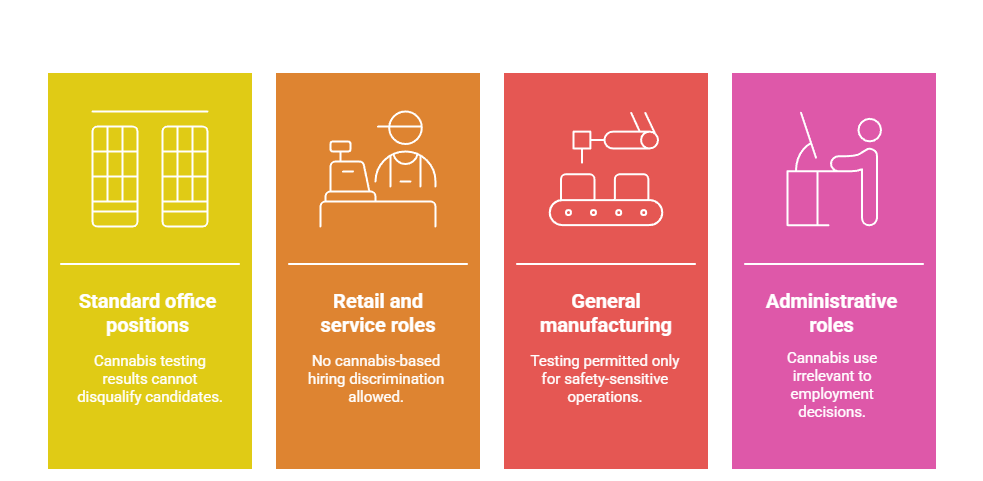
- Standard office positions: Cannabis testing results cannot disqualify candidates
- Retail and service roles: No cannabis-based hiring discrimination allowed
- General manufacturing: Testing permitted only for safety-sensitive operations
- Administrative roles: Cannabis use irrelevant to employment decisions
The shift requires HR departments to implement new screening protocols. As a result, many employers are streamlining their testing processes to focus only on legally permissible areas.
Workplace Testing Protocols
Ongoing workplace drug testing faces new restrictions under California cannabis employment laws. Employers cannot conduct random testing solely to detect off-duty cannabis use. Testing must be based on reasonable suspicion of workplace impairment or specific safety incidents requiring investigation.
Reasonable suspicion testing requires documented observations of impairment-related behaviors. Supervisors must receive training to identify actual impairment versus general cannabis use. This protects workers from arbitrary testing while maintaining legitimate workplace safety protocols.
Federal Contractor and DOT Exemptions
Federal contractors and Department of Transportation regulated employers maintain broad exemptions from California cannabis employment laws. These positions involve federal oversight requiring compliance with federal drug-free workplace requirements. The exemptions recognize that state laws cannot supersede federal regulatory mandates.
DOT-regulated positions include commercial drivers, airline pilots, railroad operators, and pipeline workers. These roles involve interstate commerce and federal safety regulations that explicitly prohibit cannabis use. California cannot provide protections that would conflict with federal transportation safety requirements.
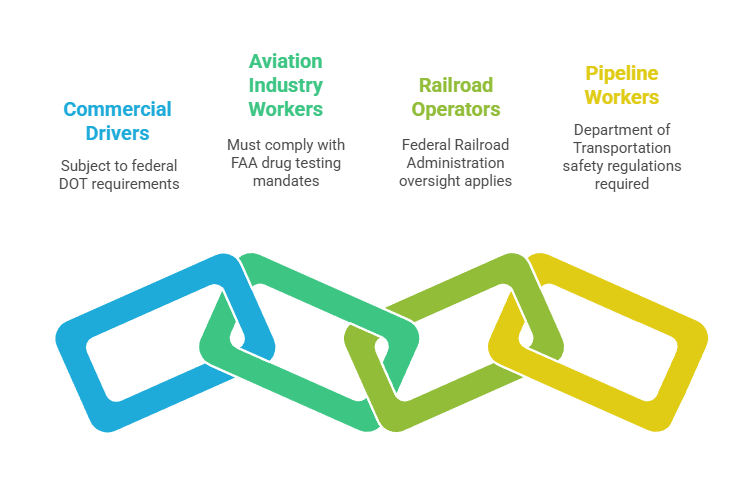
- Commercial drivers with CDL licenses: Subject to federal DOT requirements
- Aviation industry workers: Must comply with FAA drug testing mandates
- Railroad operators: Federal Railroad Administration oversight applies
- Pipeline workers: Department of Transportation safety regulations required
Workers in these exempt categories should understand that federal requirements take precedence over state protections. However, exemptions apply only to positions directly subject to federal oversight. Companies cannot broadly claim federal contractor status to avoid compliance with California cannabis employment laws.
Employer Compliance and Best Practices
Employers must comprehensively update workplace policies to reflect California cannabis employment laws. Existing drug and alcohol policies likely conflict with new legal requirements and expose companies to discrimination claims. Policy updates require careful legal review to ensure full compliance while maintaining legitimate safety protections.
Documentation becomes crucial for employers claiming safety-sensitive exemptions or maintaining cannabis restrictions. Companies must clearly articulate why specific positions require cannabis testing or prohibition. Generic safety language or outdated policy justifications may not withstand legal scrutiny under the new law.
Updated policies should clearly distinguish between impairment and off-duty use. Employees need clear guidance on workplace expectations and testing protocols. Transparent policies reduce confusion and help prevent inadvertent violations of the new legal requirements.
Policy Updates and Documentation
Comprehensive policy revision represents a critical first step for employer compliance. Companies should review all employment handbooks, job descriptions, and testing protocols. These documents must align with California drug testing cannabis laws to avoid potential legal challenges.
| Policy Area | Required Changes | Documentation Needed |
| Pre-employment screening | Remove cannabis disqualification | Position-specific justifications |
| Workplace testing | Limit to reasonable suspicion | Training records for supervisors |
| Disciplinary procedures | Separate impairment from use | Clear behavioral standards |
Legal counsel should review all policy changes before implementation. Additionally, companies should train HR staff on the new requirements to ensure consistent application across all employment decisions.
Training and Implementation
Supervisor training represents a critical compliance component for California cannabis employment laws. Managers must understand the difference between workplace impairment and off-duty cannabis use. Training should cover legal requirements, proper documentation procedures, and appropriate responses to suspected impairment.
HR departments need comprehensive training on the new legal landscape. This includes understanding exemptions, proper testing procedures, and discrimination prevention. Regular training updates ensure ongoing compliance as implementation practices evolve and legal interpretations develop.
Employee Rights and Protections
California cannabis employment laws provide robust protections for workers facing discrimination. Employees who believe they've experienced cannabis-related discrimination can file complaints with the California Civil Rights Department. The law includes provisions for damages, reinstatement, and attorney fees in successful cases.
Protected activities include off-duty cannabis consumption, medical marijuana use, and refusing to provide information about lawful cannabis activities. Employers cannot retaliate against workers who assert their rights under the new law. Retaliation protections extend to filing complaints, participating in investigations, or opposing discriminatory practices.
Workers should document any potential discrimination and consult with employment attorneys familiar with cannabis law. The legal landscape remains evolving, with courts still interpreting specific applications of the new protections. Early legal consultation can help protect rights and prevent ongoing violations.
Filing Complaints and Legal Remedies
The California Civil Rights Department handles complaints related to cannabis employment discrimination. Workers have 365 days from the discriminatory act to file their complaint. However, earlier filing often leads to better evidence preservation and faster resolution.
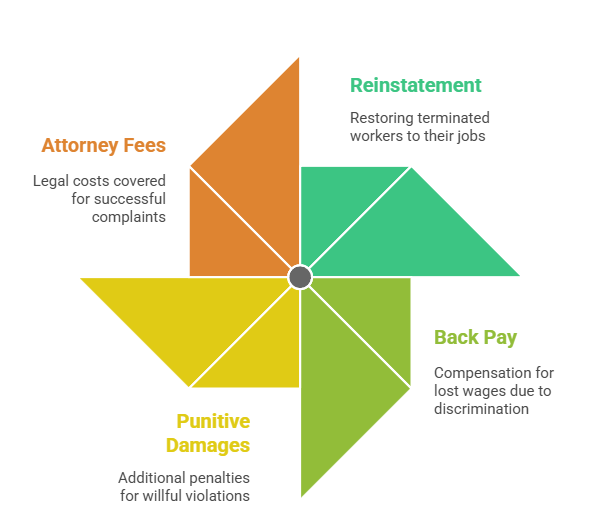
- Reinstatement: Courts can order employers to restore terminated workers
- Back pay: Compensation for lost wages due to discrimination
- Punitive damages: Additional penalties for willful violations
- Attorney fees: Legal costs covered for successful complaints
Documentation strengthens discrimination claims significantly. Therefore, workers should maintain records of all employment communications and decisions related to cannabis use.
Understanding Your Rights as an Employee
Workers need to understand both their protections and limitations under the new law. While off-duty cannabis use receives broad protection, workplace impairment remains grounds for discipline. Employees should familiarize themselves with their company's updated policies and procedures.
Medical marijuana patients have additional rights beyond recreational users. These workers may request reasonable accommodations for their medical needs. The interactive process requires good faith participation from both employees and employers to find workable solutions.
Impact on Different Industries
The construction industry experiences significant changes under California AB 2273. Building trades workers receive explicit protection despite working in potentially dangerous environments. This recognition acknowledges that proper safety training and protocols can address risks without discriminating against off-duty cannabis users.
Manufacturing companies must carefully evaluate their positions for genuine safety-sensitive requirements. Assembly line workers, quality control inspectors, and administrative staff typically don't qualify for exemptions. However, employees operating heavy machinery or handling hazardous materials may remain subject to cannabis restrictions.
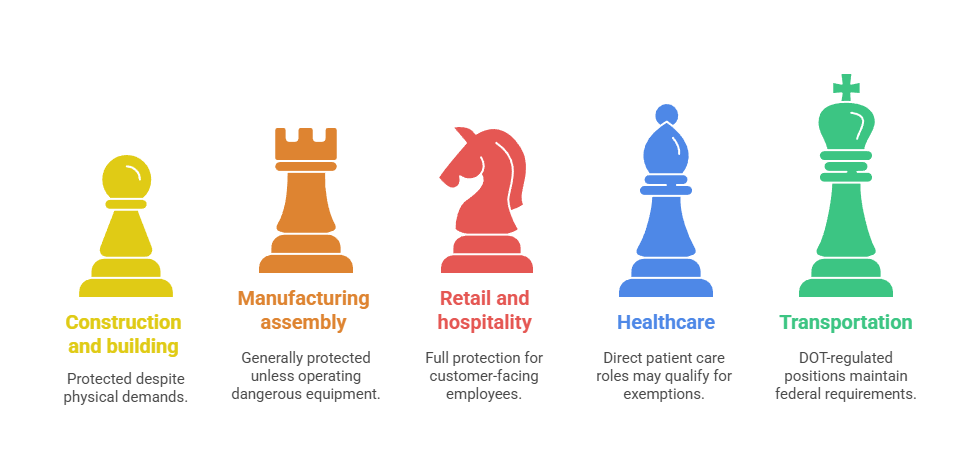
- Construction and building trades: Protected despite physical demands
- Manufacturing assembly: Generally protected unless operating dangerous equipment
- Retail and hospitality: Full protection for customer-facing employees
- Healthcare: Direct patient care roles may qualify for exemptions
- Transportation: DOT-regulated positions maintain federal requirements
Technology companies and office-based businesses face the most straightforward compliance requirements. These employers must simply eliminate cannabis-based discrimination from their practices. Remote workers and office staff receive comprehensive protection under the new law.
Looking Ahead: Future Developments
California cannabis employment laws continue evolving as implementation proceeds throughout 2025. Courts are interpreting various aspects of AB 2273, creating precedent for future cases. Employers and employees should monitor legal developments to understand their rights and obligations fully.
Additional legislation may address remaining gaps in the current law. Proposed bills could expand protections or clarify exemptions for specific industries. The California legislature remains active in cannabis policy reform, suggesting further changes ahead.
Federal policy changes could also impact California cannabis employment laws. Congressional action on cannabis scheduling or banking could affect federal contractor exemptions. Workers and employers should stay informed about both state and federal developments affecting workplace cannabis policies.
Conclusion
California's AB 2273 fundamentally transforms the relationship between cannabis use and employment, providing unprecedented protections for workers while maintaining necessary safety exemptions. The law reflects California's continued leadership in cannabis policy reform and worker protection. Both employers and employees must navigate this new landscape carefully, understanding their rights and obligations under the evolving legal framework. Success requires ongoing attention to compliance, proper implementation of new policies, and recognition that California cannabis employment laws represent just the beginning of broader workplace cannabis reform nationwide.
Frequently Asked Questions
Can I be fired for testing positive for marijuana in California?
Under AB 2273, most California employers cannot fire employees solely for testing positive for cannabis metabolites from off-duty use. However, safety-sensitive positions, federal contractors, and DOT-regulated jobs maintain exemptions allowing termination for positive cannabis tests. The law distinguishes between off-duty use and workplace impairment, protecting workers from discrimination while allowing employers to address safety concerns.
What jobs can still drug test for marijuana in California?
Safety-sensitive positions including federal contractors, DOT-regulated transportation workers, healthcare providers with direct patient care, law enforcement, and positions requiring federal security clearance can still conduct cannabis drug testing. These exemptions exist because federal regulations supersede state law or because the positions involve direct safety risks to the public or vulnerable populations.
When did California's new cannabis employment law take effect?
AB 2273 became effective January 1, 2024, prohibiting most employers from discriminating against workers for off-duty cannabis use. The law applies to hiring, firing, and other employment decisions based solely on cannabis metabolite testing. Employers had the remainder of 2024 to update their policies and procedures to comply with the new requirements.
Do California cannabis employment laws apply to medical marijuana patients?
Yes, medical marijuana patients receive protection under AB 2273, often with enhanced accommodation requirements. Employers must engage in an interactive process with medical cannabis users, similar to other disability accommodations, unless the position qualifies for safety-sensitive exemptions. Medical patients may request reasonable workplace accommodations for their treatment needs.
Can employers still test for marijuana impairment at work?
California employers can still test for workplace impairment and maintain drug-free workplace policies. The law prohibits discrimination based on off-duty use but allows employers to address actual workplace impairment through reasonable suspicion testing and proper documentation. Employers must train supervisors to distinguish between impairment and general cannabis use.
What should I do if I face cannabis-related employment discrimination?
Document the discrimination, review your employer's policies, and consult with an employment attorney familiar with California cannabis employment laws. You can file complaints with the California Civil Rights Department within 365 days of the discriminatory act and may be entitled to reinstatement, damages, and attorney fees. Early legal consultation helps protect your rights and strengthen potential claims.
Are there any exceptions for small businesses under California cannabis employment laws?
AB 2273 applies to employers of all sizes in California, with no small business exemptions. However, the same safety-sensitive position exemptions apply regardless of company size. Small businesses must comply with the new law but may have fewer resources for policy updates and training, making legal guidance particularly important for compliance.
How do California cannabis laws affect background checks?
The new law doesn't directly address background checks, but employers cannot use lawful cannabis activity as grounds for employment discrimination. Past cannabis-related arrests or convictions that wouldn't disqualify someone under California's existing fair chance laws cannot be used to circumvent AB 2273 protections. Employers must focus on job-related qualifications rather than cannabis history.
Additional Resources
Still have questions?
Get in touch with our team today for a personalized demo and discover how our tailored volume pricing and packages can drive results for your business!
How useful was this page?*
Note: your comments are anonymous. We use them to improve the website. Do not include any personal details.
Visit our FCRA Compliance Tool or leave a message here if you need a response.
From the blog Explore the GCheck Content Hub

Employment Credit Checks: 2026 Guide to Legal Compliance and Best Practices
7 Jan, 2026 • 27 min read
I-9 Form Management Systems: Modernizing Employment Eligibility Verification for 2026
6 Jan, 2026 • 19 min read
EEOC Compliance Requirements 2026: Complete Employer Guide to Fair Hiring Practices
29 Dec, 2025 • 24 min readThe information provided in this article is for general informational and educational purposes only and should not be construed as legal advice or a substitute for consultation with qualified legal counsel. While we strive to ensure accuracy, employment screening laws and regulations—including but not limited to the Fair Credit Reporting Act (FCRA), Equal Employment Opportunity Commission (EEOC) guidelines, state and local ban-the-box laws, industry-specific requirements, and other applicable federal, state, and local statutes—are subject to frequent changes, varying interpretations, and jurisdiction-specific applications that may affect their implementation in your organization. Employers and screening decision-makers are solely responsible for ensuring their background check policies, procedures, and practices comply with all applicable laws and regulations relevant to their specific industry, location, and circumstances. We strongly recommend consulting with qualified employment law attorneys and compliance professionals before making hiring, tenant screening, or other decisions based on background check information.

